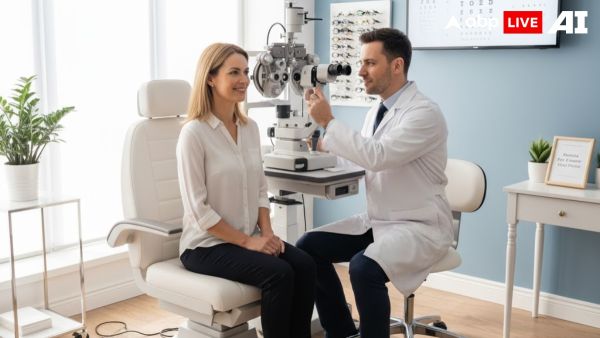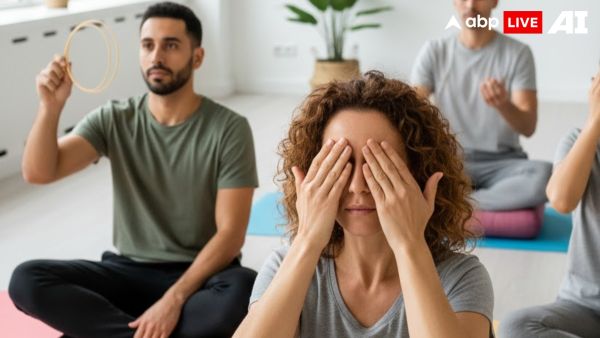
Our eyes are the windows to the world, but still many of us take vision health for granted. With increasing screen time, pollution, and lifestyle pressures, protecting our eyes has become more crucial than ever. This World Sight Day 2025, let’s focus on actionable steps to preserve eyesight, prevent common eye problems, and enhance overall vision health. From daily habits to nutrition and preventive care, these 8 tips are designed to help your eyes stay sharp, comfortable, and healthy for years to come.
1. Regular Eye Exams

Routine eye check-ups are essential for maintaining long-term vision health. Many eye conditions, like glaucoma, macular degeneration, and diabetic retinopathy, develop silently without noticeable symptoms. Visiting an ophthalmologist or optometrist at least once a year allows early detection and treatment of potential issues before they escalate. During these check-ups, your eye care professional can assess your prescription, check intraocular pressure, and examine the overall health of your retina and optic nerve. Proactive monitoring ensures that any corrective measures or lifestyle adjustments can be implemented promptly.
2. Protect Eyes From Harmful UV Rays

Prolonged exposure to ultraviolet (UV) rays can lead to cataracts, macular degeneration, and other eye disorders. Wearing high-quality sunglasses that block 100% of UVA and UVB rays is vital when stepping outdoors, even on cloudy days. You can opt for wraparound sunglasses or wide-brimmed hats that can further reduce exposure while adding style to your look. Beyond fashion, UV protection shields sensitive structures in the eyes from long-term damage caused by radiation.
3. Maintain A Nutrition-Rich Diet

Your diet directly impacts the health of your eyes. Nutrients like vitamin A, C, E, omega-3 fatty acids, lutein, and zeaxanthin play a crucial role in preventing eye diseases and maintaining a clear vision. Leafy greens like pinach and kale, colourful vegetables such as carrots and bell peppers, and fatty fish like salmon and mackerel are excellent sources of these nutrients. Antioxidants help combat oxidative stress, protecting your eyes from cellular damage caused by free radicals. Incorporating these nutrient-rich foods into daily meals not only supports overall health but also strengthens your eyes against age-related degeneration.
4. Limit Screen Time And Reduce Digital Eye Strain

Extended exposure to computer screens, smartphones, and tablets can cause digital eye strain, blurred vision, and headaches. Following the 20-20-20 rule, looking at something 20 feet away every 20 minutes for at least 20 seconds, can significantly reduce strain. Adjusting screen brightness and using anti-glare filters also protect the eyes from excessive light exposure. Maintaining a proper viewing distance and ensuring ergonomic posture prevents tension in the neck and shoulders, which can indirectly affect eye comfort. For students engaged in online learning, structured screen breaks are essential to avoid long-term vision problems.
5. Perform Eye Exercises Daily

Just as physical exercise strengthens the body, eye exercises can enhance flexibility, focus, and overall visual comfort. Techniques like rolling the eyes clockwise and counterclockwise, focusing on near and distant objects alternately, and blinking frequently reduce eye fatigue and improve blood circulation. Palming, where you cover your closed eyes with your palms, relaxes ocular muscles and relieves tension. Practising these exercises regularly can alleviate strain that caused by reading, screen usage, or prolonged concentration.
6. Maintain Proper Lighting While Reading Or Writing

Adequate lighting is crucial to prevent eye strain and headaches during reading, writing, or using screens. Insufficient light forces your eyes to work harder, causing fatigue and dryness. Positioning a desk lamp at the right angle and using ambient lighting can help reduce glare and shadows. Warm, indirect lighting is ideal for comfort, while natural daylight remains the best source when available. Adjusting screen brightness to match surrounding light conditions prevents sudden contrast, which can strain the eyes.
7. Practice Good Eye Hygiene

Keeping your eyes clean and free from irritants is essential for avoiding infections and allergic reactions. Make sure you always wash your hands first before touching your eyes and avoid rubbing them if you feel irritation. For contact lens users, following the correct hygiene protocols, cleaning lenses, replacing them on schedule, and using fresh solution, prevents bacterial growth and discomfort. By adopting simple habits, you protect your eyes from unnecessary stress and preserve their natural health.
8. Stay Hydrated To Prevent Dry Eyes

Dehydration can directly affect the eyes. It leads to dryness, redness, and irritation. Drinking an adequate amount of water throughout the day ensures proper tear production, which keeps the eyes lubricated and comfortable. In dry or air-conditioned environments, using a humidifier can further prevent moisture loss. Staying hydrated also benefits overall health, supporting blood circulation and nutrient delivery to ocular tissues.
[Disclaimer: The information provided in the article is intended for general informational purposes only. It is not a substitute for professional medical advice, diagnosis, or treatment. Always seek the advice of your physician or other qualified healthcare provider with any questions you may have regarding a medical condition.]
-
Why does it suddenly become dark in front of the eyes after standing? Learn the reason for this and home remedies

-
Google launches Pixel 10 Pro Fold and Pixel Buds 2a in India

-
Free Fire Max: Today’s Redeem Code for Players has become Live, Free Diamonds and Skins Claim

-
Gmail -Zoho Mail Tips- Do you want to switch from Gmail to Zoho Mail, know its easy process

-
Tender for 200 2BHK flats for employees in Mumbai – Obnews
